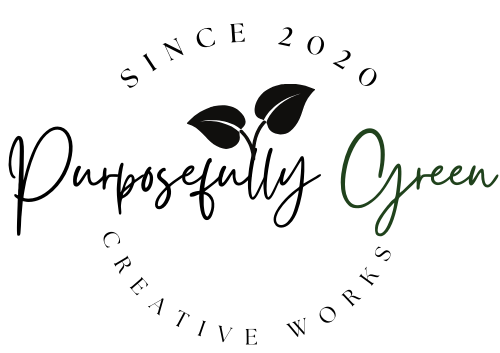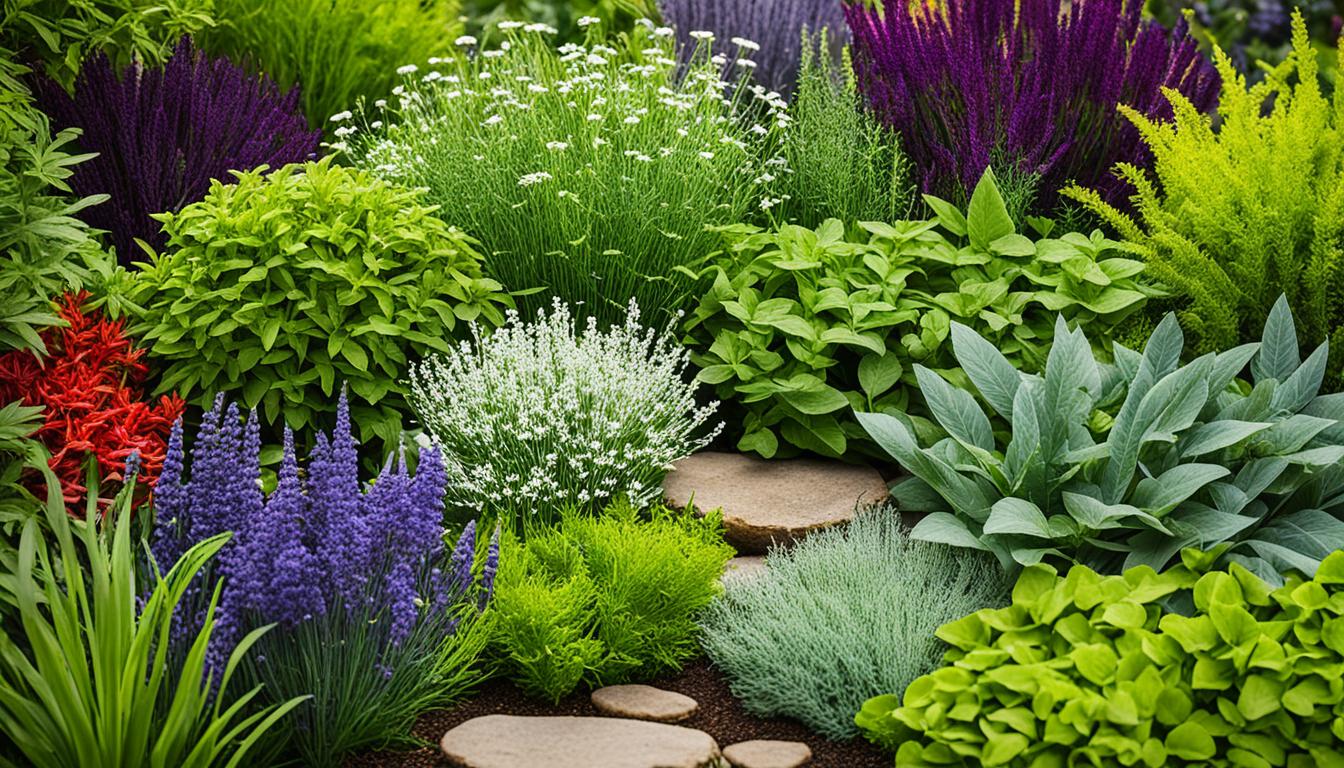As an avid nature lover and advocate for holistic health, I am continuously amazed by the power of plants to promote wellness. In this article, I will be diving into the world of healing gardens and the extraordinary benefits of incorporating medicinal plants into your outdoor oasis. Join me as we explore the fascinating realm of herbal remedies, garden therapy, and the profound connection between nature and well-being.
Imagine stepping into a lush healing garden, surrounded by vibrant foliage and the intoxicating scents of various medicinal plants. It’s not just a beautiful sight; it’s a sanctuary for the mind, body, and spirit. By carefully selecting and cultivating specific medicinal plants, you can create a space that nurtures both physical and emotional well-being.
Key Takeaways:
- Healing gardens combine the beauty of nature with the therapeutic benefits of medicinal plants.
- Medicinal plants have been used for centuries to promote holistic health and treat various ailments.
- Garden therapy, or horticultural therapy, offers numerous physical and mental well-being benefits.
- By embracing plant-based wellness, you can tap into nature’s pharmacy and support your body’s natural healing processes.
- Creating a healing garden is an opportunity to connect with the natural world and cultivate a sense of peace and harmony.
The Healing Garden: Herbs for Health and Wellness
“The Healing Garden” by Deb Soule, founder of Avena Botanicals, is an inspiring guide to herb gardening and crafting herbal remedies that promote wellness of spirit and body. Soule shares her practical advice on various aspects of fostering a garden filled with helpful, healing plants, including biodynamic gardening practices, gathering plants, and creating herbal teas, decoctions, tinctures, and more. The book also provides detailed information on eighteen medicinal herbs, their cultivation, and healing properties. It is a resourceful tool for anyone interested in harnessing the power of medicinal plants for their well-being.
Avena Botanicals: Handcrafted Herbal Products for Wellness
At Avena Botanicals, we are passionate about harnessing the healing power of plants to promote wellness of the body, mind, and spirit. With over three decades of experience, we specialize in creating handcrafted herbal products using fresh, organic, and Biodynamic® herbs.
Our commitment to quality begins with the careful selection of herbs. We hand-harvest our plants at peak potency, ensuring that they are brimming with the beneficial compounds that nature intended. These herbs are then processed in our on-site production facility located in Rockport, Maine.
Why do we choose fresh, organic, and Biodynamic® herbs? Because we believe that the purest and most potent ingredients come from the earth itself. By using herbs grown in nutrient-rich soil, free from harmful chemicals, we can create products that are not only effective but also environmentally conscious.
When you choose Avena Botanicals, you can trust that you are getting the highest quality herbal products, crafted with care and intention. From soothing herbal teas and tinctures to nourishing skin care and body products, our offerings are designed to support your well-being in a holistic way.
Our Commitment to Sustainable Practices
We are dedicated to sustainability and the health of our planet. It is our responsibility to care for the earth and its resources, which is why we incorporate Biodynamic® farming practices into our cultivation methods. By working in harmony with nature, we can foster a thriving ecosystem that benefits both plants and people.
Additionally, we prioritize the use of recyclable and eco-friendly packaging, minimizing our impact on the environment. We strive to maintain transparency in our practices and ingredients, ensuring that you can make informed choices about your wellness journey.
| Benefits of Avena Botanicals | Our Product Range |
|---|---|
|
|
Experience the power of nature with Avena Botanicals. Explore our wide range of herbal products and embark on a journey of wellness that is rooted in the wisdom of plants.
The Healing Garden: A Distillation of Herbal Wisdom
“The Healing Garden” by Deb Soule is a distillation of her many years of herbal relationship and service. This book provides a comprehensive overview of working with herbs, covering everything from gathering plants to drying and preserving them. Soule emphasizes the importance of respect for the plants and the land, delivering a heartfelt plea for the integration of herbal remedies into households and community clinics. With beautiful photography by Molly Haley, this book is a treasure trove of herbal wisdom.
Cultivating a Biodynamic Garden for Healing
Cultivating a biodynamic garden is an essential aspect of creating a healing space. Biodynamic gardening practices prioritize the interconnection between plants, soil, and the broader ecosystem. This holistic approach not only benefits the environment but also enhances the health and vitality of plants, resulting in potent medicinal herbs that offer profound healing properties.
Implementing biodynamic principles in your garden can be a transformative experience. By nurturing the soil through composting and organic matter, you create a rich and fertile foundation for your plants to thrive. Emphasizing the importance of crop rotation helps prevent soil depletion and promotes long-term sustainability. Working with lunar cycles and celestial rhythms harmonizes your garden with the natural ebb and flow of cosmic energy, further enhancing plant growth and medicinal potency.
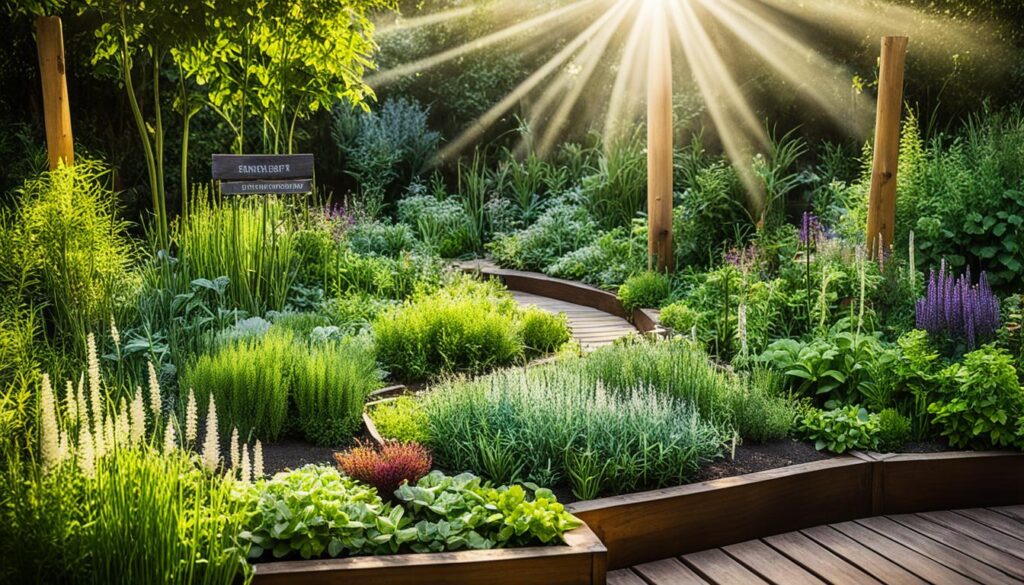
Biodynamic gardening is an intricate dance of nourishing the land and working in harmony with nature. Each element, from nutrient-rich soil to properly timed planting, plays a vital role in the development of a vibrant and healing garden. By cultivating a biodynamic garden, you create a sacred space where the vitality of the earth and the power of medicinal herbs converge to promote holistic well-being.
Key Biodynamic Principles:
- Composting: Utilize organic matter to enrich the soil and provide essential nutrients for plant growth.
- Crop Rotation: Rotate crops seasonally to minimize pests and diseases while ensuring balanced soil fertility.
- Lunar Cycles: Take cues from the moon’s phases to guide planting, pruning, and harvesting activities.
Benefits of a Biodynamic Garden:
“A biodynamic garden is not just a collection of plants; it is a living ecosystem that fosters the growth of potent medicinal herbs and promotes healing on multiple levels.” – Jennifer Williams, Biodynamic Gardening Expert
| Benefits | Explanation |
|---|---|
| Enhanced Medicinal Potency | The interplay of nutrient-rich soil, cosmic rhythms, and sustainable practices results in the cultivation of potent medicinal herbs that offer enhanced healing properties. |
| Improved Plant Health | Biodynamic gardening fosters strong and robust plants, reducing the risk of diseases and pests and supporting long-term sustainability. |
| Environmental Stewardship | By nurturing the soil and working with natural cycles, biodynamic gardeners embrace and promote sustainable practices that benefit the environment. |
| Holistic Well-being | A biodynamic garden provides a sanctuary for healing, offering a connection to nature and a source of vitality for mind, body, and spirit. |
The Power of Medicinal Herbs in Herbal Medicine
In the world of natural remedies, medicinal herbs have played a vital role for centuries in traditional herbal medicine. These remarkable plants possess bioactive compounds that offer specific healing properties and have been used to treat various health conditions. When incorporated into your healing garden, medicinal herbs allow you to tap into nature’s pharmacy and reap the benefits of these potent natural remedies.
One such herb is calming chamomile, known for its soothing properties that promote relaxation and ease tension. Its gentle aroma and delicate yellow flowers make it a beautiful addition to any garden. Another powerful herb is immune-boosting echinacea, which has been traditionally used to support the body’s defense mechanisms.
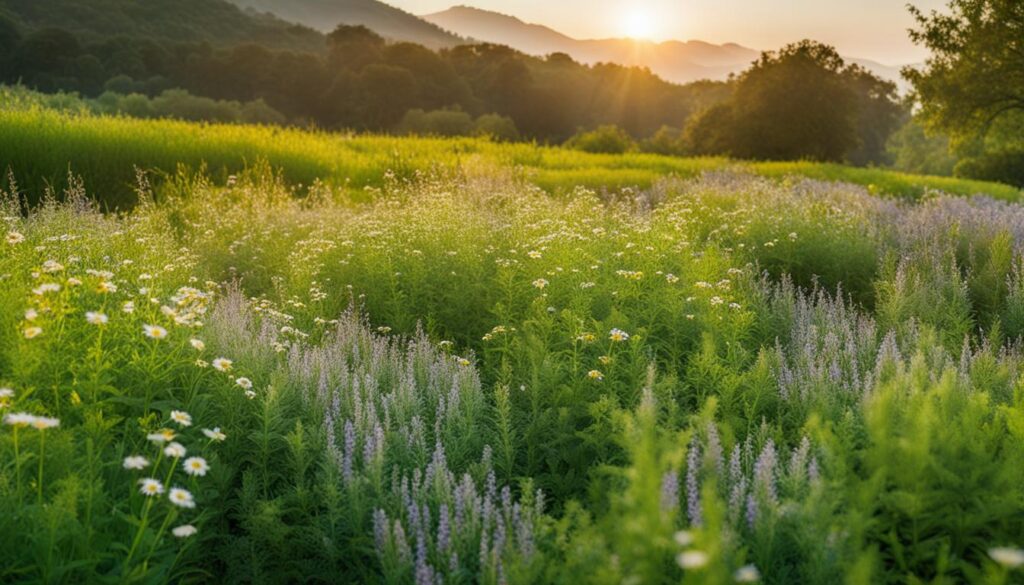
The beauty of medicinal herbs lies in their versatility and wide range of applications. From promoting digestion and relieving inflammation to aiding sleep and boosting vitality, medicinal herbs offer natural remedies for a myriad of ailments and support overall wellness. Their effectiveness is attributed to the presence of various chemical compounds, such as antioxidants, flavonoids, and essential oils, which work synergistically to promote healing and restore balance in the body.
The use of medicinal herbs in herbal medicine is rooted in a holistic approach to well-being, focusing on the interconnectedness of mind, body, and spirit. By embracing the power of medicinal herbs, we tap into the wisdom of ancient healing practices and unlock nature’s inherent ability to restore and promote health.
Whether you’re seeking natural remedies for specific health concerns or simply looking to enhance your overall wellness, the inclusion of medicinal herbs in your healing garden can be a transformative experience.
“The power of nature in its purest form resides within medicinal herbs, waiting to be discovered and harnessed for our benefit.” – Unknown
Garden Therapy: Connecting with Nature for Well-Being
Garden therapy, also known as horticultural therapy, is a practice that involves connecting with nature and engaging in gardening activities to promote well-being. The act of spending time in a healing garden and tending to plants has been scientifically proven to reduce stress, improve mood, and enhance overall mental and physical health.
When I step into my garden, I feel an immediate sense of calm and serenity wash over me. The fresh air, the vibrant colors, and the scent of nature all contribute to a feeling of tranquility. Whether it’s planting seeds, pruning plants, or simply sitting amidst the greenery, garden therapy allows me to immerse myself in the wonders of nature and find solace amidst the chaos of daily life.
The Benefits of Garden Therapy
Engaging in garden therapy offers a multitude of benefits for our well-being. Here are some of the remarkable ways in which connecting with nature through gardening can improve our lives:
- Stress reduction: The act of gardening helps to lower cortisol levels, a hormone associated with stress. The rhythmic movements of digging, planting, and watering serve as a form of mindfulness, allowing us to focus on the present moment and let go of worries.
- Mood enhancement: Spending time in the garden stimulates the release of endorphins, often referred to as the “feel-good” hormones. This natural boost in mood can alleviate symptoms of depression and anxiety, leaving us feeling happier and more content.
- Physical health benefits: Gardening is an excellent form of low-impact exercise, providing opportunities for gentle movements and stretching. Regular physical activity in the garden can improve cardiovascular health, increase flexibility, and strengthen muscles.
- Connection with nature: Garden therapy enables us to reconnect with the natural world and nurture an appreciation for its beauty and cycles. As we observe the growth and transformation of plants, we develop a deeper understanding of the interconnectedness of all living beings.
“In every walk with nature, one receives far more than he seeks.” – John Muir
Embarking on Garden Therapy
Ready to embark on your own garden therapy journey? Follow these simple steps to get started:
- Find a space: Identify an area in your backyard or create an indoor garden if you have limited outdoor space. Choose a location that receives adequate sunlight and has good soil drainage.
- Select plants: Research plants that thrive in your climate and align with your gardening goals. Consider selecting a mix of flowers, herbs, and vegetables to create a diverse and visually appealing garden.
- Get your hands dirty: Roll up your sleeves and start planting! Enjoy the tactile experience of working with soil, sowing seeds, and transplanting seedlings. Take your time and savor the process.
- Nurture and care: Regularly tend to your garden by watering, fertilizing, and removing weeds. Create a routine that allows you to spend time with your plants and observe their growth.
- Enjoy the harvest: As your garden flourishes, reap the rewards by harvesting the fruits of your labor. Whether it’s a bouquet of freshly cut flowers or a homegrown meal, relish in the satisfaction of enjoying the fruits of your garden.
By embracing garden therapy, you can experience the profound benefits of connecting with nature for well-being. Cultivate your own healing garden and witness the transformative power of nurturing plants and immersing yourself in the beauty of the natural world.
Creating a Medicinal Herb Garden for Holistic Wellness
Creating a medicinal herb garden is an excellent way to cultivate holistic wellness. By carefully selecting and growing medicinal herbs, you can have a readily available source of natural remedies at your fingertips. Consider planting herbs such as lavender, calendula, and lemon balm, which have a wide range of healing properties. Design your garden with intention, creating a serene space that nurtures both body and soul.
When designing your medicinal herb garden, it’s important to choose herbs that align with your specific wellness needs. Think about the health benefits you wish to enhance, whether it’s relaxation, immune support, or stress relief. Here are some popular medicinal herbs and their healing properties:
Lavender:
Lavender is known for its calming and soothing properties. It can help promote relaxation, reduce anxiety, and improve sleep quality.
Calendula:
Calendula has anti-inflammatory and antiseptic properties. It can be used to soothe skin irritations, promote wound healing, and alleviate digestive discomfort.
Lemon Balm:
Lemon balm is often used for its calming effects. It can help reduce stress, improve mood, and support digestive health.
Creating a visually appealing and well-organized garden layout can contribute to the overall tranquility of your space. Consider incorporating pathways, seating areas, and decorative elements that enhance the aesthetic appeal of your medicinal herb garden. Here’s a simple garden design to inspire you:
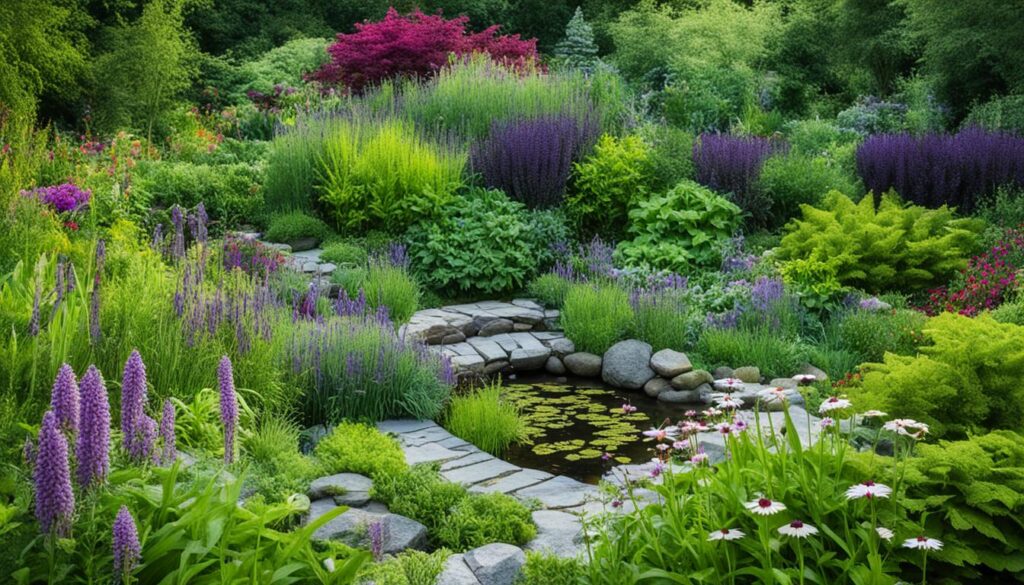
| Herb | Healing Properties |
|---|---|
| Lavender | Relaxation, anxiety relief, improved sleep |
| Calendula | Skin healing, anti-inflammatory, digestive support |
| Lemon Balm | Stress reduction, mood improvement, digestive health |
By creating a medicinal herb garden, you not only have easy access to natural remedies but also embrace the therapeutic benefits of gardening. Tending to your herbs, connecting with nature, and immersing yourself in the calming atmosphere of your garden can contribute to a sense of well-being and harmony.
In the next section, we will explore the role of plant-based wellness in holistic healing, further examining the benefits of incorporating natural remedies into your daily life.
The Role of Plant-Based Wellness in Holistic Healing
Plant-based wellness plays a vital role in promoting holistic healing. By harnessing the power of plants, we can tap into nature’s inherent ability to restore balance and enhance overall health. From herbal teas to essential oils, plant-based remedies offer gentle and natural support for the body’s healing processes.
Embracing plant-based wellness in our daily lives can contribute to our overall well-being and vitality. These natural remedies, derived from plants, provide an effective and sustainable approach to supporting our holistic health.
One of the key advantages of plant-based wellness is the absence of harsh chemicals or synthetic ingredients. By using natural plant derivatives, we can minimize the risk of adverse side effects commonly associated with conventional medications.
Herbal teas are an excellent example of plant-based wellness. Infusions made from medicinal herbs such as chamomile, peppermint, or lavender offer a soothing and therapeutic experience. These teas have been used for centuries to alleviate various ailments, including stress, digestive issues, and sleep disturbances.
From ancient civilizations to modern times, plant-based remedies have stood the test of time, providing effective relief and promoting holistic healing.”
The power of essential oils is another cornerstone of plant-based wellness. These concentrated plant extracts offer numerous therapeutic benefits when used topically, inhaled, or incorporated into massages. Essential oils like lavender, eucalyptus, and tea tree have proven to be effective in promoting relaxation, addressing respiratory issues, and boosting immunity.
The Benefits of Plant-Based Wellness:
- Promotes holistic healing and overall well-being
- Offers gentle and natural support for the body’s healing processes
- Minimizes the risk of adverse side effects
- Provides effective relief for various ailments
- Enhances relaxation and stress reduction
- Boosts immunity and supports respiratory health
By embracing plant-based wellness, we open ourselves up to a plethora of natural remedies that promote holistic healing. These plant-derived solutions empower us to take control of our health and well-being while respecting the rhythms and wisdom of nature.

The Beauty and Benefits of Garden Therapy
Garden therapy offers numerous benefits beyond physical and mental well-being. Engaging in gardening activities allows you to witness the beauty and wonders of nature firsthand. The process of planting, nurturing, and witnessing plants’ growth can bring a sense of joy and fulfillment. Moreover, garden therapy promotes environmental stewardship and an appreciation for the interconnectedness of all living beings.
Connecting with nature through gardens has a transformative effect on our well-being. The serene beauty of a well-designed garden has a calming and rejuvenating effect on the mind and body. As we immerse ourselves in nature’s symphony of colors, scents, and textures, we are reminded of the inherent beauty and harmony in the world around us.
In addition to its aesthetic appeal, garden therapy provides a multitude of physical and mental health benefits. The physical activity involved in gardening helps improve flexibility, strength, and coordination. It is a wonderful way to stay active and incorporate exercise into our daily routine.
“Gardens are not made by sitting in the shade.” – Rudyard Kipling
The benefits of garden therapy extend beyond physical health. Gardening has been shown to reduce stress, anxiety, and depression, promoting overall mental well-being. The act of nurturing plants and watching them flourish promotes a sense of purpose and accomplishment, boosting self-esteem and confidence.
The Benefits of Garden Therapy:
- Enhances psychological well-being
- Reduces stress and anxiety
- Boosts mood and happiness
- Improves physical health and fitness
- Increases mindfulness and relaxation
- Provides a sense of purpose and fulfillment
- Promotes social interaction and community engagement
Garden therapy also fosters an appreciation for the environment and encourages sustainable practices. By growing our own plants and nurturing them, we develop a deeper understanding of the delicate balance of ecosystems and our role in preserving them.
| Beauty: | Benefits: |
|---|---|
| Gardens enhance the aesthetic appeal of our surroundings. | Garden therapy improves physical and mental well-being. |
| Colorful flowers and lush greenery create visually pleasing landscapes. | Gardening activities provide exercise and promote physical fitness. |
| The symphony of scents and sounds in a garden creates a tranquil atmosphere. | Gardening reduces stress, anxiety, and depression. |
| Watching plants grow and flourish brings a sense of joy and fulfillment. | Garden therapy boosts mood, happiness, and overall well-being. |
By immersing ourselves in the beauty of gardens and embracing garden therapy, we can cultivate a deeper connection with nature and experience the profound benefits it offers. Whether you have a small balcony garden or an expansive backyard, the act of tending to plants and witnessing their growth can be a source of wonder, inspiration, and personal growth.
Conclusion
Creating a healing garden filled with medicinal plants is a transformative experience that can turn your space into a sanctuary of holistic health. By incorporating the power of medicinal herbs, engaging in garden therapy, and embracing plant-based wellness, you can cultivate a harmonious environment that nurtures your mind, body, and spirit.
Medicinal plants offer a natural and effective way to support your well-being. From calming chamomile to immune-boosting echinacea, these plants bring the benefits of nature’s pharmacy right to your doorstep. By growing your own medicinal herbs, you have access to a readily available source of remedies that can help promote balance and health.
Garden therapy, also known as horticultural therapy, provides a holistic approach to well-being. Spending time in your healing garden, connecting with nature, and tending to your plants can reduce stress, improve mood, and enhance both physical and mental health. The act of nurturing and witnessing the growth of your garden can bring a sense of joy, purpose, and connection with the natural world.
Embracing plant-based wellness and creating a healing garden allows you to align with the wisdom of nature. Whether it’s cultivating a biodynamic garden, crafting herbal remedies, or simply taking a moment to breathe in the fragrant scents of your healing plants, you are actively engaging in your own journey of holistic healing. So, start cultivating your healing garden today and experience the profound benefits of connecting with nature and harnessing its incredible healing properties.
FAQ
What are healing gardens?
Healing gardens are specially designed spaces that incorporate plants with medicinal properties to promote well-being and holistic healing.
What are medicinal plants?
Medicinal plants are plants that contain bioactive compounds with specific healing properties that can be used for natural remedies.
How can creating a healing garden contribute to wellness?
Creating a healing garden provides a serene space for relaxation, stress reduction, and connection with nature, which can enhance overall wellness.
What is “The Healing Garden” by Deb Soule?
“The Healing Garden” is a comprehensive guide by Deb Soule that provides practical advice on herb gardening and crafting herbal remedies for wellness.
What is Avena Botanicals?
Avena Botanicals is a company that specializes in handcrafted herbal products made from fresh, organic, and Biodynamic® herbs.
What is biodynamic gardening?
Biodynamic gardening is an approach that prioritizes the interconnection between plants, soil, and the broader ecosystem, promoting the health and vitality of plants.
What are medicinal herbs used for?
Medicinal herbs have been used for centuries in herbal medicine to treat various health conditions and support overall well-being.
What is garden therapy?
Garden therapy, also known as horticultural therapy, is a practice that involves connecting with nature and engaging in gardening activities to promote well-being.
How can I create a medicinal herb garden?
You can create a medicinal herb garden by carefully selecting and growing herbs with healing properties, creating a serene space that nurtures both body and soul.
What is plant-based wellness?
Plant-based wellness refers to the use of plants and their derivatives to support holistic healing and promote overall well-being.
What are the benefits of garden therapy?
Garden therapy offers numerous benefits, including stress reduction, improved mood, and a sense of joy and fulfillment through nurturing plants and connecting with nature.
